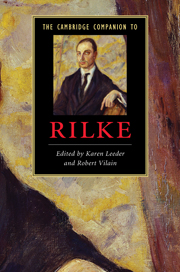Book contents
- Frontmatter
- Introduction
- PART I LIFE
- PART II WORKS
- PART III CULTURAL CONTEXTS, INFLUENCES, RECEPTION
- 8 Rilke and modernism
- 9 Rilke the reader
- 10 Rilke and the visual arts
- 11 Rilke: thought and mysticism
- 12 Rilke and his philosophical critics
- 13 Rilke’s legacy in the English-speaking world
- Appendix: Poem titles
- Guide to further reading
- Index
- Index of works
11 - Rilke: thought and mysticism
from PART III - CULTURAL CONTEXTS, INFLUENCES, RECEPTION
Published online by Cambridge University Press: 28 July 2010
- Frontmatter
- Introduction
- PART I LIFE
- PART II WORKS
- PART III CULTURAL CONTEXTS, INFLUENCES, RECEPTION
- 8 Rilke and modernism
- 9 Rilke the reader
- 10 Rilke and the visual arts
- 11 Rilke: thought and mysticism
- 12 Rilke and his philosophical critics
- 13 Rilke’s legacy in the English-speaking world
- Appendix: Poem titles
- Guide to further reading
- Index
- Index of works
Summary
There is a long tradition of treating Rilke as a philosophical poet. Perhaps the most prominent of those who have done so is Martin Heidegger, for whom Rilke was, in Hölderlin's phrase, 'a poet in time of need'. But Heidegger is not alone. One of the first books by Otto F. Bollnow, the philosopher of vitalism, was an in-depth study of Rilke (1951). The phenomenologist Hermann Schmitz derived the title of one of his books, The Inexhaustible Object (1990), from one of The Sonnets to Orpheus (II: 6), explaining his entire philosophical project with reference to this text. And to the list of those who have offered significant readings of Rilke, one should add a range of such philosophers, theologians and critics as Hans-Georg Gadamer, Gabriel Marcel, Franz Josef Brecht, Fritz-Joachim von Rintelen, Romano Guardini, Käte Hamburger, Maurice Blanchot, and Hans Urs von Balthasar.
It is true that Rilke was never a philosopher in his own right, and it would be a mistake to read him on the purely propositional level. But it would equally be mistaken to assume that, because Rilke's ambitions were aesthetic, his work has no philosophical dimension, or that his conception of what it means to be a poet does not have philosophical implications. In his essay of 1902 on the great Belgian Symbolist Maurice Maeterlinck, Rilke specifically problematised the relationship between the task of the philosopher (the search for truth) and the task of the poet (the search for beauty), for in his view these two activities are now more closely linked than ever before (KA iv, 217). As we shall see, Rilke was right about this, not least in the case of his own work.
- Type
- Chapter
- Information
- The Cambridge Companion to Rilke , pp. 159 - 173Publisher: Cambridge University PressPrint publication year: 2010
- 3
- Cited by

